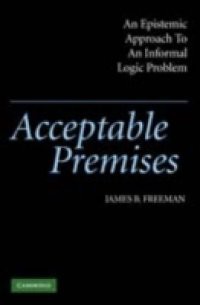When, if ever, is one justified in accepting the premises of an argument? What is the proper criterion of premise acceptability? Can the criterion be theoretically or philosophically justified? This is the first book to provide a comprehensive theory of premise acceptability and it answers the questions above from an epistemological approach that the author calls common sense foundationalism. It will be eagerly sought out not just by specialists in informal logic, critical thinking, and argumentation theory but also by a broader range of philosophers and those teaching rhetoric.

